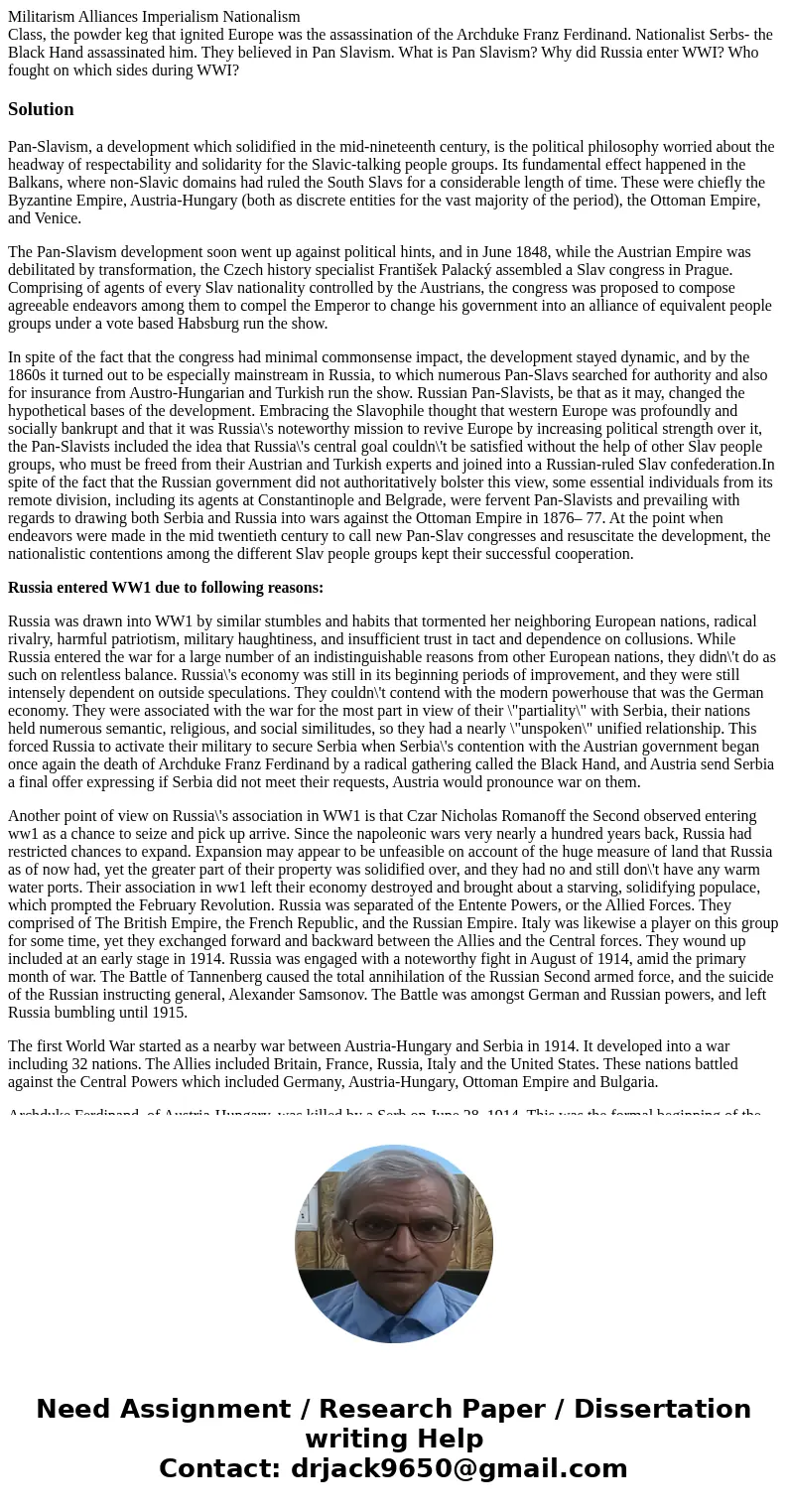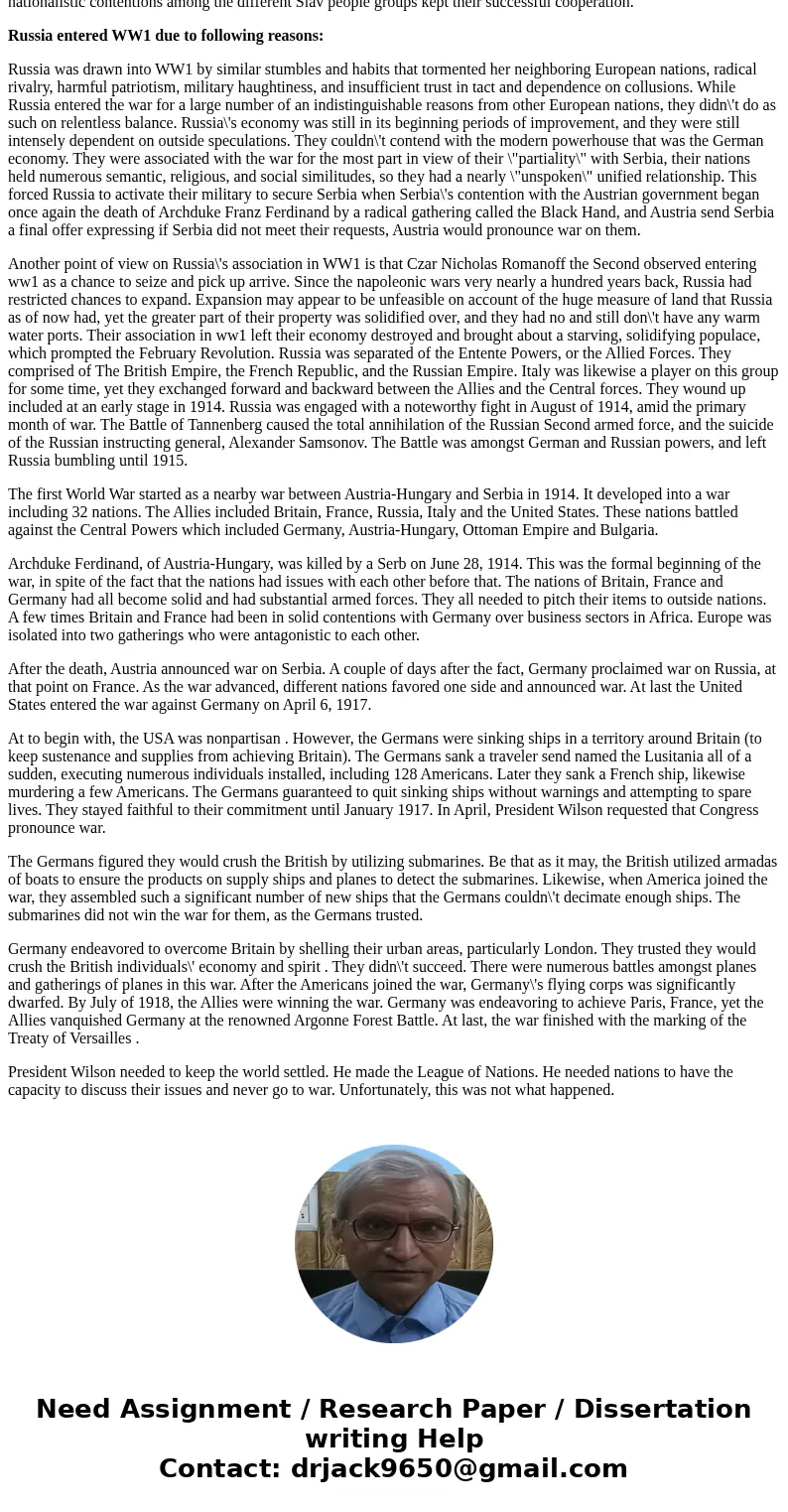Militarism Alliances Imperialism Nationalism Class the powde
Militarism Alliances Imperialism Nationalism
Class, the powder keg that ignited Europe was the assassination of the Archduke Franz Ferdinand. Nationalist Serbs- the Black Hand assassinated him. They believed in Pan Slavism. What is Pan Slavism? Why did Russia enter WWI? Who fought on which sides during WWI?
Solution
Pan-Slavism, a development which solidified in the mid-nineteenth century, is the political philosophy worried about the headway of respectability and solidarity for the Slavic-talking people groups. Its fundamental effect happened in the Balkans, where non-Slavic domains had ruled the South Slavs for a considerable length of time. These were chiefly the Byzantine Empire, Austria-Hungary (both as discrete entities for the vast majority of the period), the Ottoman Empire, and Venice.
The Pan-Slavism development soon went up against political hints, and in June 1848, while the Austrian Empire was debilitated by transformation, the Czech history specialist František Palacký assembled a Slav congress in Prague. Comprising of agents of every Slav nationality controlled by the Austrians, the congress was proposed to compose agreeable endeavors among them to compel the Emperor to change his government into an alliance of equivalent people groups under a vote based Habsburg run the show.
In spite of the fact that the congress had minimal commonsense impact, the development stayed dynamic, and by the 1860s it turned out to be especially mainstream in Russia, to which numerous Pan-Slavs searched for authority and also for insurance from Austro-Hungarian and Turkish run the show. Russian Pan-Slavists, be that as it may, changed the hypothetical bases of the development. Embracing the Slavophile thought that western Europe was profoundly and socially bankrupt and that it was Russia\'s noteworthy mission to revive Europe by increasing political strength over it, the Pan-Slavists included the idea that Russia\'s central goal couldn\'t be satisfied without the help of other Slav people groups, who must be freed from their Austrian and Turkish experts and joined into a Russian-ruled Slav confederation.In spite of the fact that the Russian government did not authoritatively bolster this view, some essential individuals from its remote division, including its agents at Constantinople and Belgrade, were fervent Pan-Slavists and prevailing with regards to drawing both Serbia and Russia into wars against the Ottoman Empire in 1876– 77. At the point when endeavors were made in the mid twentieth century to call new Pan-Slav congresses and resuscitate the development, the nationalistic contentions among the different Slav people groups kept their successful cooperation.
Russia entered WW1 due to following reasons:
Russia was drawn into WW1 by similar stumbles and habits that tormented her neighboring European nations, radical rivalry, harmful patriotism, military haughtiness, and insufficient trust in tact and dependence on collusions. While Russia entered the war for a large number of an indistinguishable reasons from other European nations, they didn\'t do as such on relentless balance. Russia\'s economy was still in its beginning periods of improvement, and they were still intensely dependent on outside speculations. They couldn\'t contend with the modern powerhouse that was the German economy. They were associated with the war for the most part in view of their \"partiality\" with Serbia, their nations held numerous semantic, religious, and social similitudes, so they had a nearly \"unspoken\" unified relationship. This forced Russia to activate their military to secure Serbia when Serbia\'s contention with the Austrian government began once again the death of Archduke Franz Ferdinand by a radical gathering called the Black Hand, and Austria send Serbia a final offer expressing if Serbia did not meet their requests, Austria would pronounce war on them.
Another point of view on Russia\'s association in WW1 is that Czar Nicholas Romanoff the Second observed entering ww1 as a chance to seize and pick up arrive. Since the napoleonic wars very nearly a hundred years back, Russia had restricted chances to expand. Expansion may appear to be unfeasible on account of the huge measure of land that Russia as of now had, yet the greater part of their property was solidified over, and they had no and still don\'t have any warm water ports. Their association in ww1 left their economy destroyed and brought about a starving, solidifying populace, which prompted the February Revolution. Russia was separated of the Entente Powers, or the Allied Forces. They comprised of The British Empire, the French Republic, and the Russian Empire. Italy was likewise a player on this group for some time, yet they exchanged forward and backward between the Allies and the Central forces. They wound up included at an early stage in 1914. Russia was engaged with a noteworthy fight in August of 1914, amid the primary month of war. The Battle of Tannenberg caused the total annihilation of the Russian Second armed force, and the suicide of the Russian instructing general, Alexander Samsonov. The Battle was amongst German and Russian powers, and left Russia bumbling until 1915.
The first World War started as a nearby war between Austria-Hungary and Serbia in 1914. It developed into a war including 32 nations. The Allies included Britain, France, Russia, Italy and the United States. These nations battled against the Central Powers which included Germany, Austria-Hungary, Ottoman Empire and Bulgaria.
Archduke Ferdinand, of Austria-Hungary, was killed by a Serb on June 28, 1914. This was the formal beginning of the war, in spite of the fact that the nations had issues with each other before that. The nations of Britain, France and Germany had all become solid and had substantial armed forces. They all needed to pitch their items to outside nations. A few times Britain and France had been in solid contentions with Germany over business sectors in Africa. Europe was isolated into two gatherings who were antagonistic to each other.
After the death, Austria announced war on Serbia. A couple of days after the fact, Germany proclaimed war on Russia, at that point on France. As the war advanced, different nations favored one side and announced war. At last the United States entered the war against Germany on April 6, 1917.
At to begin with, the USA was nonpartisan . However, the Germans were sinking ships in a territory around Britain (to keep sustenance and supplies from achieving Britain). The Germans sank a traveler send named the Lusitania all of a sudden, executing numerous individuals installed, including 128 Americans. Later they sank a French ship, likewise murdering a few Americans. The Germans guaranteed to quit sinking ships without warnings and attempting to spare lives. They stayed faithful to their commitment until January 1917. In April, President Wilson requested that Congress pronounce war.
The Germans figured they would crush the British by utilizing submarines. Be that as it may, the British utilized armadas of boats to ensure the products on supply ships and planes to detect the submarines. Likewise, when America joined the war, they assembled such a significant number of new ships that the Germans couldn\'t decimate enough ships. The submarines did not win the war for them, as the Germans trusted.
Germany endeavored to overcome Britain by shelling their urban areas, particularly London. They trusted they would crush the British individuals\' economy and spirit . They didn\'t succeed. There were numerous battles amongst planes and gatherings of planes in this war. After the Americans joined the war, Germany\'s flying corps was significantly dwarfed. By July of 1918, the Allies were winning the war. Germany was endeavoring to achieve Paris, France, yet the Allies vanquished Germany at the renowned Argonne Forest Battle. At last, the war finished with the marking of the Treaty of Versailles .
President Wilson needed to keep the world settled. He made the League of Nations. He needed nations to have the capacity to discuss their issues and never go to war. Unfortunately, this was not what happened.


 Homework Sourse
Homework Sourse